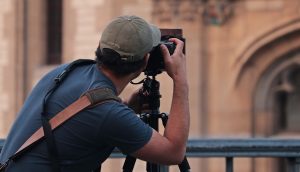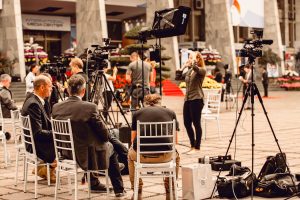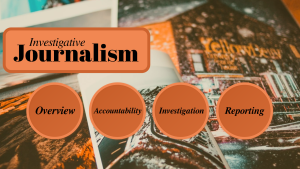43 Investigative Journalism
Learning Objectives
-
Explore the practice of investigative journalism, including major techniques and its impact on society.
-
Evaluate arguments in a text, including the validity of the reasoning, and the relevance and sufficiency of the evidence.
Chapter & Discussion
This chapter includes a presentation that can be navigated in a classroom setting or independently. You can access the presentation via the link below.
Journalism Skills: Investigative Journalism
Work through the different sections of the chapter and discuss ideas and topics as they arise. If you’re working independently, take notes instead. Notes and active discussion will be helpful in navigating this week’s assignments.
Overview
Investigative journalism refers to in-depth reporting that uncovers information of public interest or significance, often that someone did not want revealed. Key aspects:
- Digging deeper into issues of public concern
- Exposing corruption, human rights violations, and environmental issues
- Revealing the truth and acting as a watchdog over leaders and institutions
The goal of investigative journalists is to provide well-researched, compelling reports that spark reforms, policy changes, investigations, or greater transparency on important issues.

Accountability
Any journalist can be an investigative journalist. It is a big part of the role of journalists to inform the public when something corrupt is happening. Two big spaces for this are:
Government– Investigating government fraud, corruption, or cover-ups of wrongdoing. Examples: misuse of public funds, undisclosed conflicts of interest, failure to protect public health.
Institutions and Companies– Probing business practices and workplace issues that are kept from the public. Examples: environmental violations, deceptive marketing, systemic discrimination.
Investigation
When a journalist is working on a feature, they must go above and beyond their regular reporting duties. It takes significant time, resources, and journalistic expertise. They need to:
- Research, track down sources, confirm accuracy, connect dots, and report substantial stories
- Access public and non-public documents, data sources, and conduct extensive interviews
- Connect the dots between a wide body of evidence
- Find a way to get the truth when something doesn’t add up

Reporting
The actual reporting on a feature requires extra attention as well. These reporters must go the extra mile on accuracy, narrative accessibility, ethics enforcement. Some considerations:
- Sourcing and accuracy – Exhaustive fact checking and verification from credible sources is essential since the stories make explosive claims or reveal secreted truths
- Legal considerations – Investigative teams vet stories heavily with legal experts/editors to avoid libel, protect confidential sources, and minimize legal liabilities
- Privacy, bias and ethics – Strict safeguards protect whistleblowers and avoid endangering the vulnerable
Assigned Reading
Here are this week’s readings. Additionally, please read for your own personal enjoyment for 1/2 hour each day. This will be called your “Reading Zone” reading and it will coincide with many upcoming activities.
What Is Investigative Journalism? by The Global Investigative Journalism Network
Problem Set: Practice Your Skills
Click here to complete a ten-question problem set on concepts in this chapter.
Completing problem sets like this can be an important element of independent study towards completing your HSE. I write these to resemble the style of questions you’ll find on the Reading and Language Arts GED.
Assignment: Investigative Report- The GED (500 Words)
The goal of this assignment is to do a little research on the GED and report what you find. Imagine you are an investigative journalist and you want to know whether this test is serving the public or if it has some issues that we should know about.
Your story can follow any questions you have about the GED. You can also use any of the following questions in your investigating/reporting:
-
Who owns the GED test? What is their ultimate goal?
-
What exactly is the GED trying to measure? Does it do a good job?
-
Are there any biases in the test that would make certain groups score higher?
-
Could someone have the skills to earn their HSE but still struggle to pass the GED? Why?
-
Is there a problem with a corporation having control over peoples’ futures?
Your story should follow the inverted pyramid structure and have the following elements:
-
A headline
-
A lede: a short paragraph that tells us the big idea of your story
-
A nut graph (nutshell paragraph): a longer paragraph that goes into more detail
-
One or two paragraphs to provide evidence (such as quotes) for your claims
-
Make sure you substantiate all your evidence by telling the audience where you found it
Assignment: Reading Zone Response (250 Words)
For Reading Zone, you must find a novel that is interesting to you and enjoyable to read. If you need help finding a Reading Zone book, please ask. Please read your Reading Zone book for a half-hour each day. On class days, there will be time in class dedicated to reading.
Create a two-paragraph response to the reading you did this week. The first paragraph should summarize what you read this week. The second paragraph should address the following prompt:
What have you learned about the author’s perspective and personality from reading this book? Would you be friends with this author? Why or why not?


